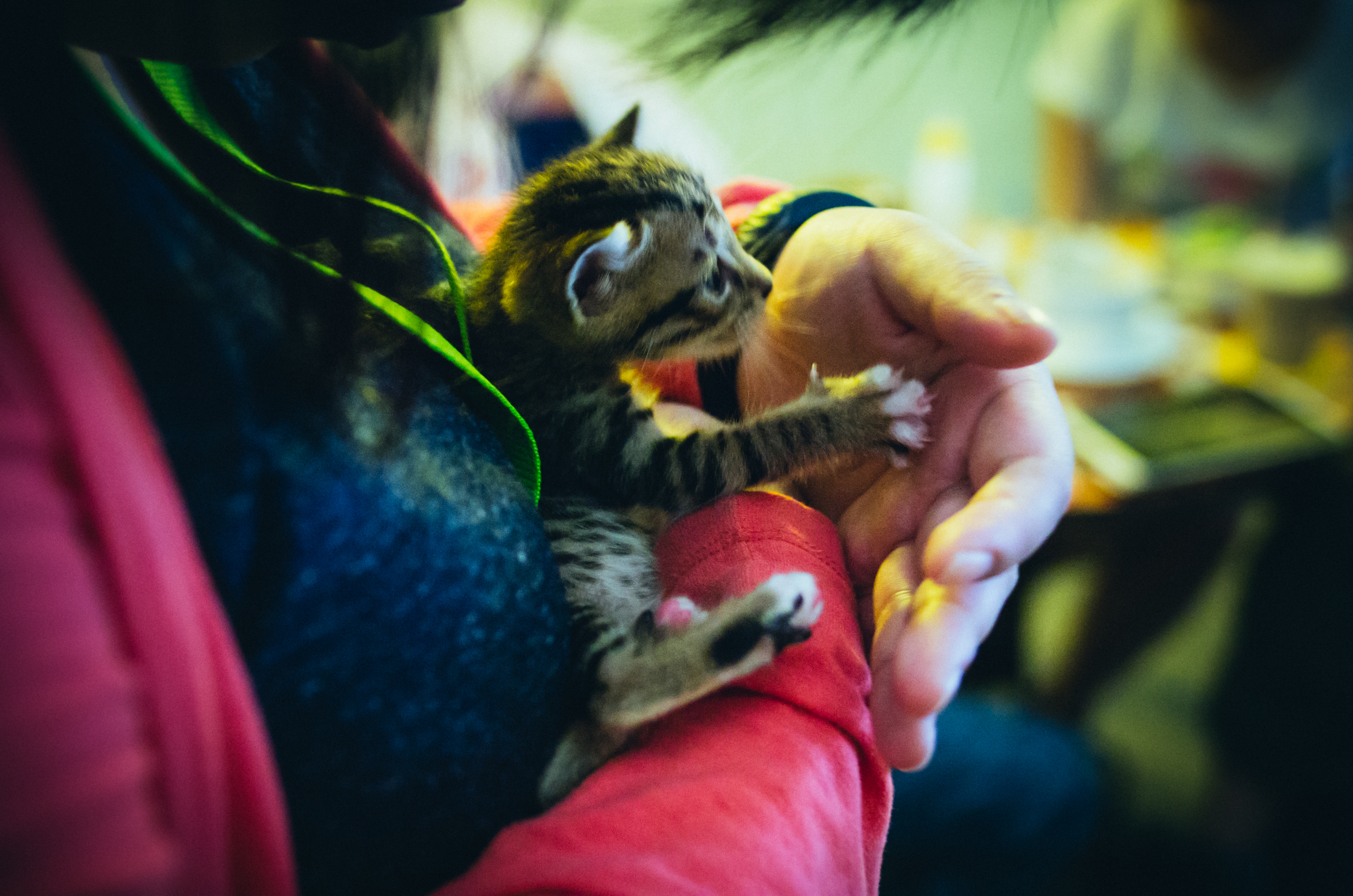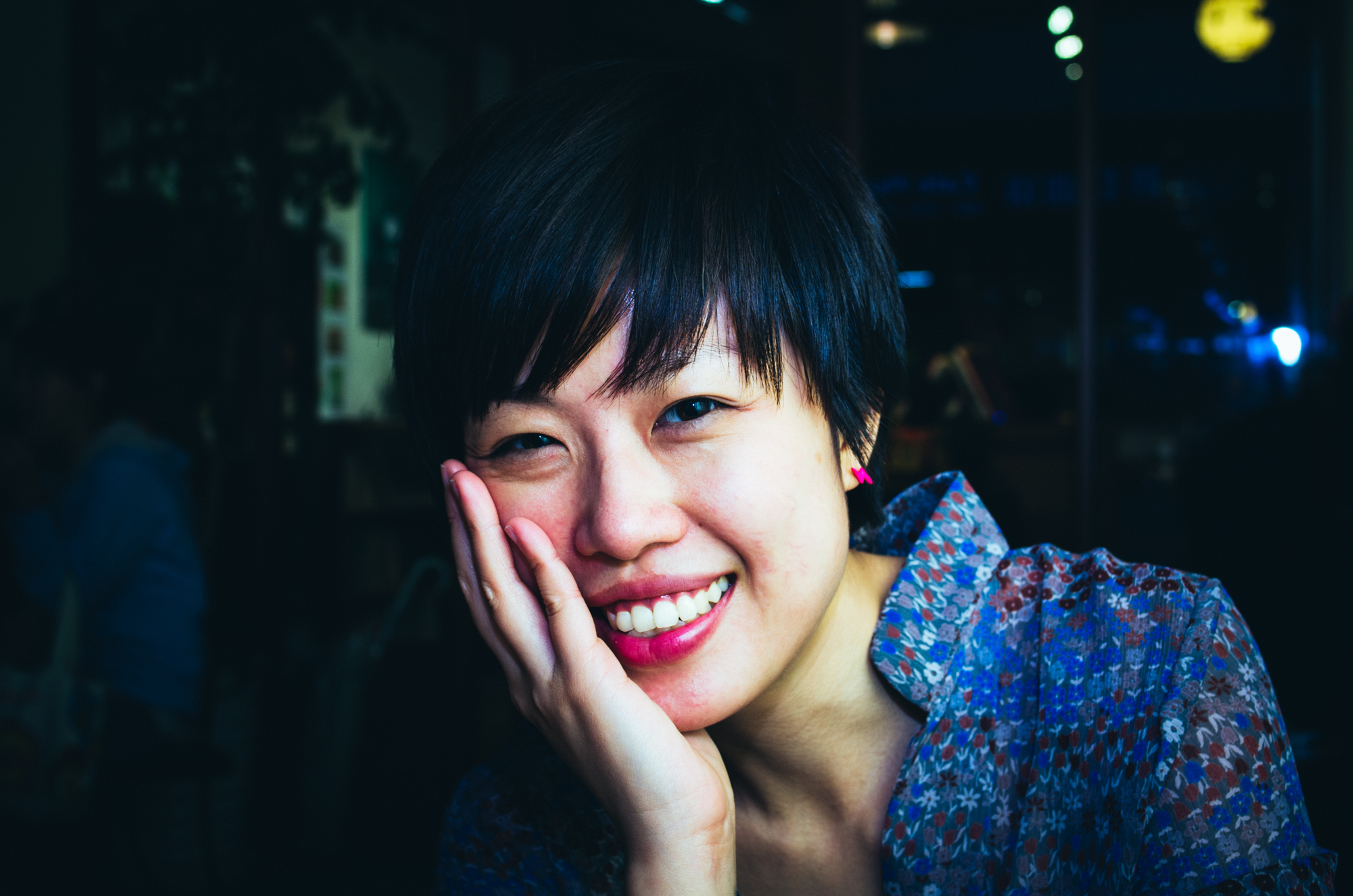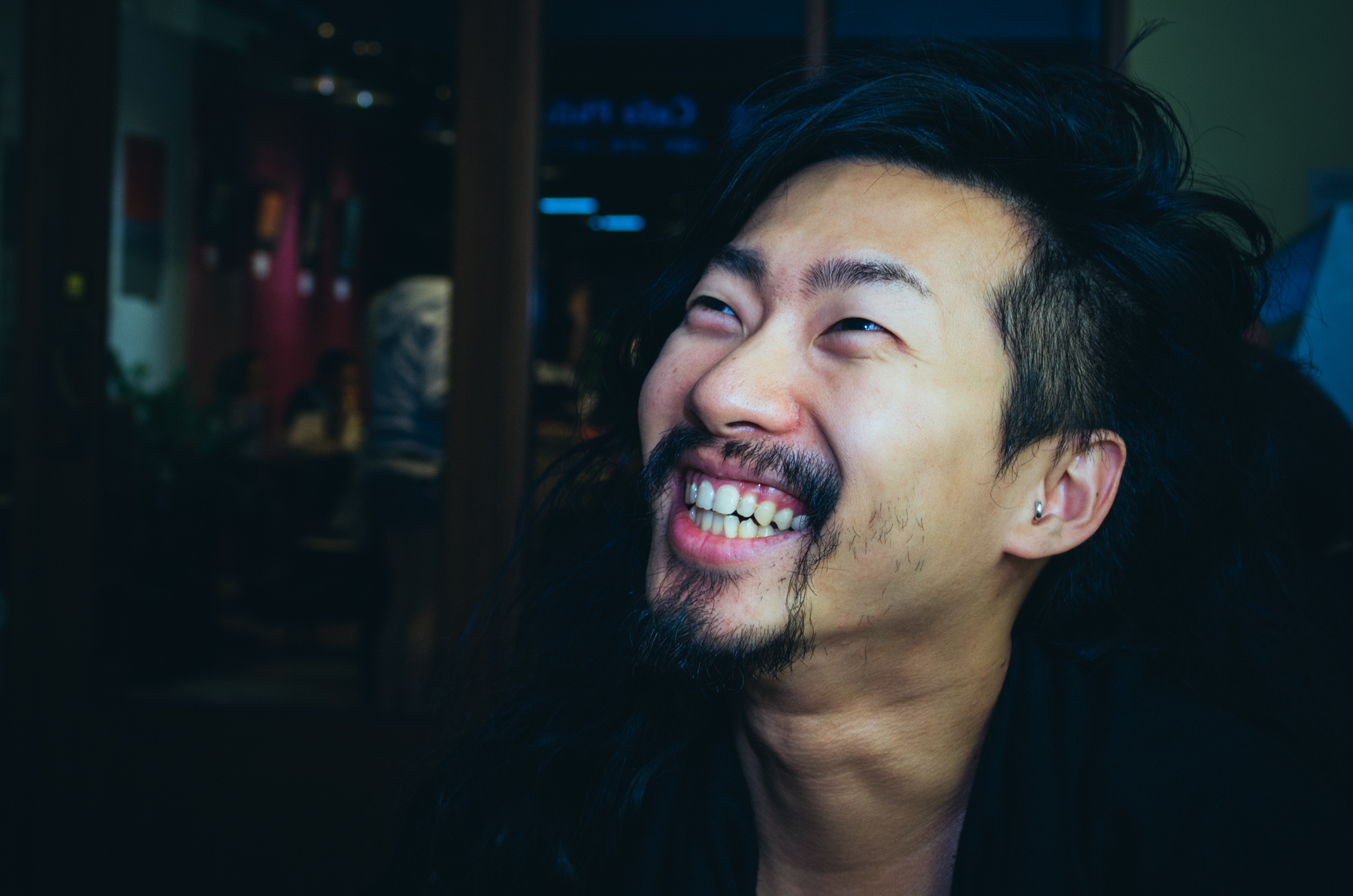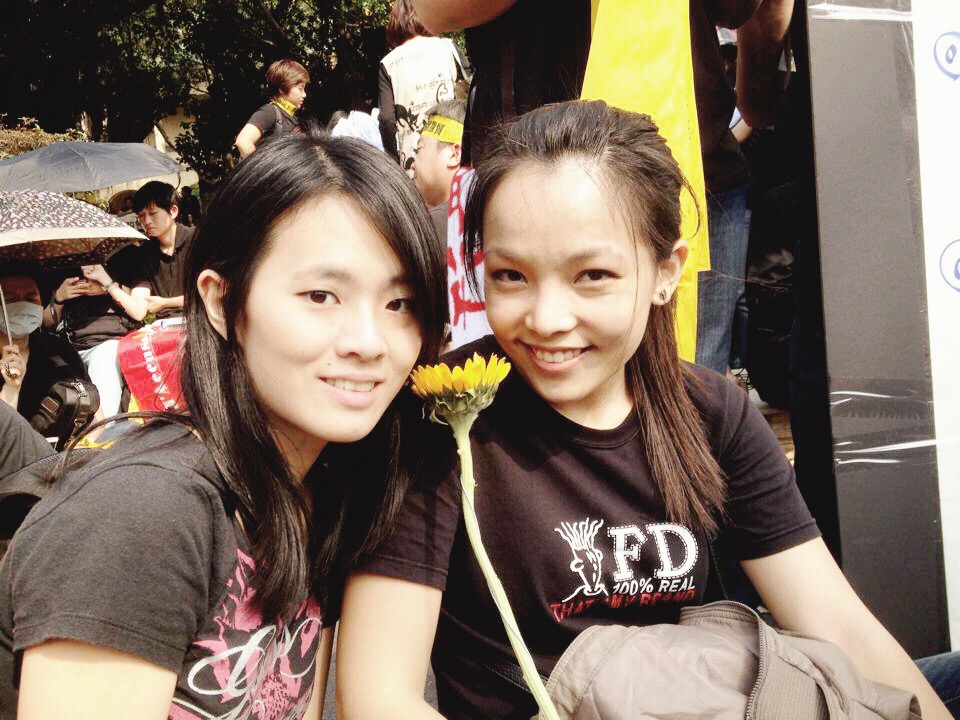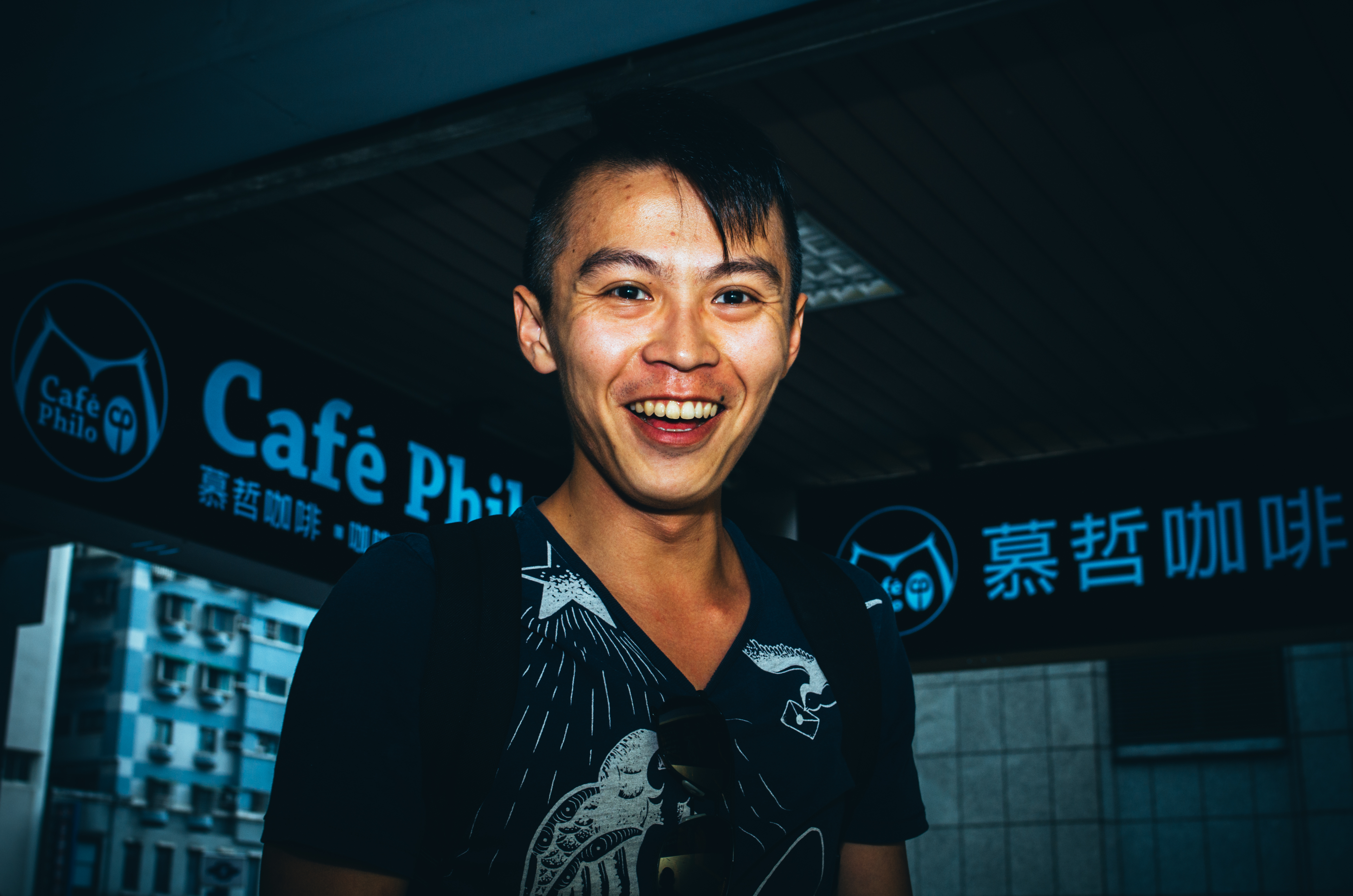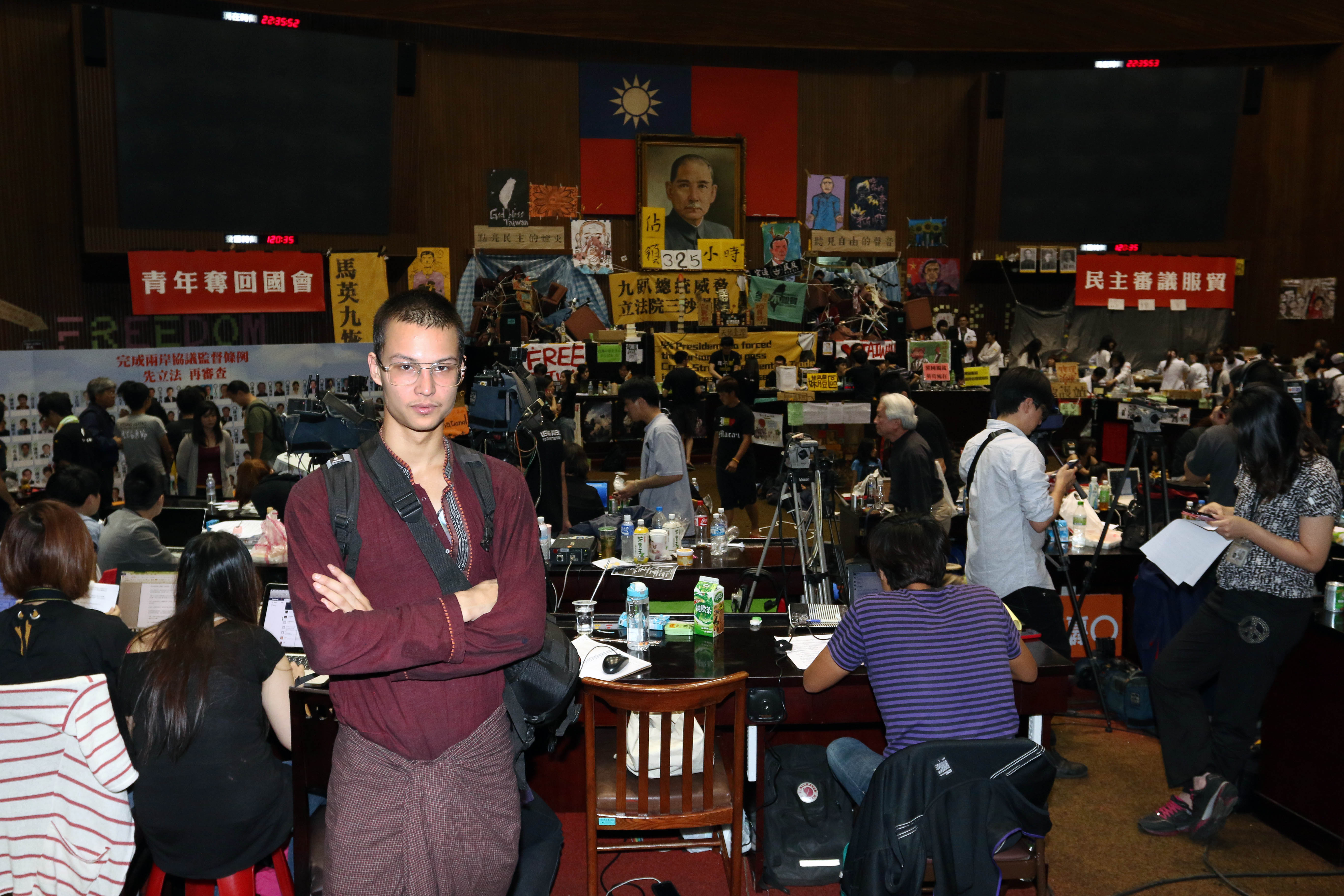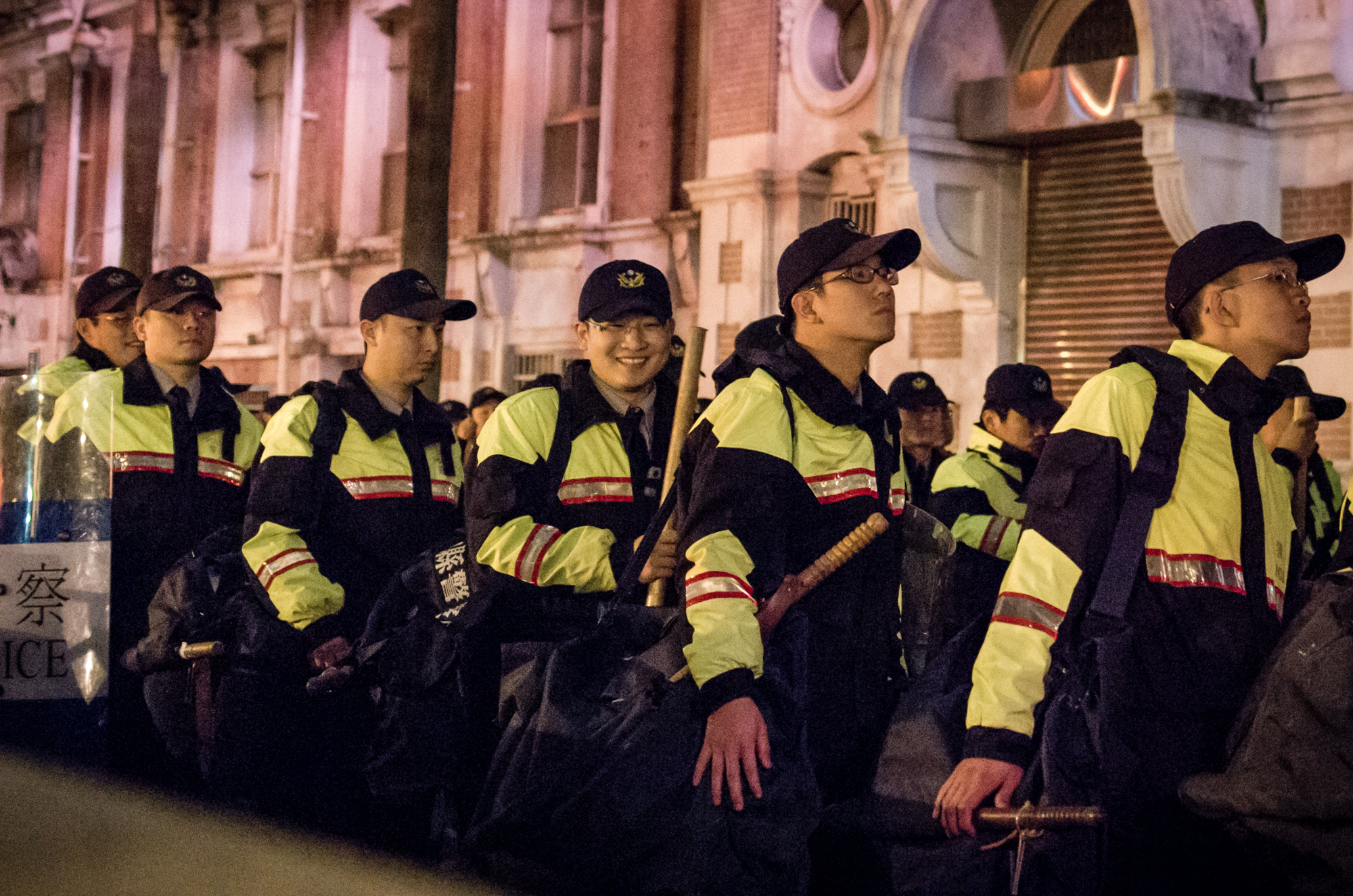15 Taiwanese Sunflower Movement protestors and one police officer open up about what it was like to (possibly) save their country’s democracy.
interviews by Karen E. Bender
photographs by Lucie Starr*
(continued from Part 1 of this interview series)
Writer Karen E. Bender interviewed 15 protestors at a local café in Taipei, Taiwan and one police officer outside of Taipei on April 26 and May 4, 2014, respectively. Some interviews were conducted in English and others were conducted in Mandarin with translation by Ian Rowen, Jason Jones or Marie Turner. Ian Rowen is a Fulbright scholar researching cross-strait relations and tourism between China and Taiwan and has been speaking Mandarin fluently for 16 years; Jason Jones (a pseudonym) is an American with extensive language and cultural experiences across Taiwan and China since 2002. Marie Turner (who wished to remain anonymous) is Taiwanese and speaks both Mandarin and English. One interviewee wished to remain anonymous – a police officer we’ll call Tony Smith. Anonymity has been marked with an asterisk throughout.
The interviews have been translated “in their own words” with the hope to preserve the integrity of each person willing to share his or her story.
*Denotes that the photograph was provided by the subject.
Roger Wu, 20, student at National Taiwan University, Foreign language major
On March 18, I was doing my composition homework—an essay about love, relationships, and family. A friend sent me a link—the YouTube video of students invading Parliament. I was shocked. I went on the Internet—it seemed the last nonviolent solution for people to combat the government.
My parents opposed me going—they lived through martial law and were afraid of the government. They said, ‘You’re going to get into trouble if you go…the police will have records of you and it will damage your future career.’
I went in as an MIS—Management of Information Systems. I’d help maintain the network. I’d come in during the day or night and check cables and routers. We had a schedule—anyone who wanted could go and help. There were flexible shifts.
Pro-China media would pick out one piece of info and [play it on repeat]…like a photo of a student drinking a beer. They’d post it over and over…
If people got afraid, they went to a psychiatrist. I saw people crying to a psychiatrist, about how their parents were opposing their participation in the event. It was risky for relationships.
We are a proud Taiwanese people who will not surrender to any kind of tyranny. We stand not because of any profit but because we stand behind the values of Taiwan.
WHERE HE IS NOW: Roger Wu said he is preparing for the new semester, selecting courses at National Taiwan University. He said, “After the movement pulled out from the Parliament, all of the participants either diverted the power to other movements or stayed low and quiet. In other words I, just like my other classmates, [am] pretty much like [a] sleeper agent, waiting for the signal to move out to the streets once again.”
Lora Chen, 25, a psychology student at Chung-Yuen Christian University
I decided to join because I saw they needed people to help maintain the wireless network. I volunteer for a group called g0v, Ground Zero Government, which believes in open source data. I wanted to use technology to support the movement.
The first week, I stayed outside and slept outside. We used computers to monitor the computer network inside. We checked the routers—sometimes there were power interruptions; sometimes there was an interruption just because someone jostled a cord. The Legislative Yuan (LY) building is ancient. Inside, I worked on the first floor. I made sure the 10 routers and switches worked…monitored them with a laptop. I spent 10 days inside, and sometimes went home to sleep.
I study psychology, so I observe people. The security group was stressed. People were crying and depressed; they didn’t feel they could speak up. I felt a little scared by the people inside, because sometimes they felt hopeless. The decision makers were outside, and not everyone had access to the decisions being made.
There was a class structure inside the building. There were different cliques inside: There was the ‘pleb’ clique (people watching the doors), who didn’t have decision power, and the ‘decision’ clique. g0v was marginalized during the occupation—they didn’t have decision-making power, just guarded the Internet. If it was an experiment in democracy, the occupation failed as that…but even though that’s the case, any democracy is an experiment, and this is a step in that direction.
I was part of the ‘hacker’ clique, but there were only two of us, so I felt lonely sometimes.
There was a rumor that Ding Tai Fung (Michelin-starred restaurant) was delivering dumplings, but it was just a rumor.
An image I can’t forget: the internal security between thefirst and second floor—the guards at the entrance to the second floor, which was barricaded by chairs. The guards, who were students, were there, sometimes chatting, sometimes not; they were working very hard, but their voices were not heard by the decision-makers.
What I would tell people: Because we’re human, we’re selfish, but because we’re human, we have evolved to cooperate and we are willing to sacrifice some of our own power.
WHERE SHE IS NOW: Lora Chen says she is still focused on the trade agreement issue and is part of the open source community, which follows social movements. She is still part of the group gOv. She has met with a group that had been inside the Legislative Yuan, and noted, “This is a world with various voices; although we may not have the same ways to achieve the goal or gather together, all we want is a better world, a world where everyone is able to decide his or her own future.”
Betty Apple, 28, graduate student in new media at National Taiwan University of the Arts
At first, I wasn’t involved. I was doing a sound art project on a deadline. On March 18, I had shut down my Facebook so I could work on my project. I wanted to go on an introspective journey. But then my roommate told me about the protests, and I really wanted to open my Facebook. But I didn’t.
Then my uncle died of cancer and I went to his funeral. All my friends were at the Legislative Yuan (LY), even my teachers. The fifth day, I had a two-hour conversation with my parents about it in front of the TV. My father warned me not to go. They said, ‘Why are the students doing this?’
I answered, ‘All my professors are there!’
Silence! When they learned that not only students but also professors had joined the movement, it confused them, and they started thinking this was a big issue.
I started using Facebook on March 24, and a friend added me to the event, ‘Island Sunrise.’ At school, another teacher was going to help compose a song for the movement. We thought that a song would help get more people to come to the LY. The lead singer of an indie band called ‘Fire Extinguisher’ had an idea for a song, and we found musicians who would play guitar for it.
The song was composed in three days. The first day I posted on Facebook that we wanted to record a song for the Sunflower Movement; we got a thousand people joining the page in one day.
Because of this, I was able to enter the LY; the lead singer came with us inside and taught the protesters the song. By this time, some of my friends inside were getting depressed, and some were starting to leave. At that time, everyone seemed to breathe fresh air from the song; students seemed to gain more confidence.
We wanted to make a video for the movement, and recorded the song for the video. We had footage from the first day, and we wanted to have a song to accompany it. I worked on this for 24 hours a day. [On] March 30 there was going to be a big protest, and we wanted to post the video, ‘Island Sunrise’ to get people to come to the protest on March 30.
We made the video and on March 29, we posted it on YouTube. The first week, it got a million hits. The next day, 500,000 people came to the protest; we think the video worked.
As an artist, we should support the movement. In a way, as artists, we can deliver a message through art, so instead of thinking of oneself as an artist, it’s time for artists to use art as a medium to altruistically help society.
Sammy Chien, 28, working artist in new media and performance art, Taiwan-born, Asian-Canadian
I got involved in the protest because of my close friends. One of my friends was very enthusiastic from day one; during the first rainy night, he worried about the protesters getting cold and brought them boxes of raincoat donations at 4 a.m. I didn’t see it as just another protest, another meaningless political event. My brother and I brought the whole family here, to witness history.
I was worried that xenophobia could be a pitfall for this movement. In Taiwan, the majority of Taiwanese believe that they were born in Taiwan—so they are Taiwanese, not Chinese. Yet, because Taiwan’s government (Kuomintang [KMT] party) was an exile government from China, and especially after the Cultural Revolution, they believe that Taiwan has the most authentic Chinese culture. But China’s government holds [more] power, and Taiwan in international law hasn’t been able to declare its independence. So it becomes quite sensitive and ambiguous for Taiwanese to identify themselves from the global standpoint. But there is the common value in Taiwan that they are resistant to being seen as Mainland Chinese. China’s global image is quite bad; I think China deserves a lot more than how they’re portrayed in the world’s media today.
Many Taiwanese citizens still believe that Mainland Chinese are generally less civilized, less disciplined and more profit-driven. They believe that it’s the problem with the communist ruler. Therefore they want to stay away from the negative status quo of communist China. At the protests, I did see some of the people using more aggressive and inappropriate slogans such as ‘Do you want someone to be spitting by you tomorrow while you’re on the train? No, I didn’t think so! So we need to…’ To me, that’s quite unnecessary, misleading and not very global-minded thinking. Then, later, I didn’t see many signs of xenophobia. I think it got ‘cleaned up’ by the protesters. These protesters are so organized and hardworking! They really proved that the protests were not what the media said on the news—not xenophobic, nor a violent riot. They were there for bigger and better reasons.
WHERE HE IS NOW: Sammy Chien created an Internet art project called IHearYourVoice.com, which utilizes websites as an alternative platform for people to speak and listen to each other in the hopes of connecting people globally. Sammy Chien’s paper “In Search of Universality—Social Movement, Interdisciplinary Art and Expanded Media” was presented at the Symposium “Disfiguring Identity: Art, Migration and Exile,” on May 11, 2014 at Surrey Art Gallery, co-curated by On Main Gallery in Vancouver. The paper will be published both online and in hard copy in both Galleries in February, 2015.
Jennifer Cheng, 24, and Elaine Lin, 24, sales agents
*Photo provided by subject(s)
Jennifer: We went to the area by Zhongshan Road by the Legislative Yuan (LY) the night of March 19. There were speeches and media, and we spoke in the yard. We had to work during the day, but came from 7 to 11 p.m. each night.
We decided to sleep outside the LY March 21, the Friday of the first week. There were about ten thousand students sleeping on the street. They provided cardboard and shiny emergency blankets.
Saturday morning, we watched the police doing a shift change. Everyone was clapping for the police when they left. The protesters told the police, we appreciate you standing there, we know you are with us, and we know you work hard, and you are protecting us.
Then, on March 23, we heard a person saying, ‘Students have occupied the Executive Yuan (EY) and we need more people to support them.’ We got excited and thought, ‘Let’s show the government that we do have power.’ So we ran to the front of the EY, where we found police and blockades.
Elaine: We climbed over the front gate. We were excited and anxious. Someone broke a window. The crowd was yelling, ‘Return the trade agreement and fight for democracy!’
Jennifer: Someone said, there’s another way to get inside—we ran to the back of the building. People had taken off the windows and we got inside, and then we reached the computer center of the EY. It was hot and more and more people were coming. We had to get to the hallway. In the crowd going to the door, I felt someone beating my back. I shouted, ‘Don’t beat me!’ and then they beat harder.
Someone said, ‘If you’re lightweight, climb over the people pushing to get to the door.’ We got through the door to the hallway. Police were shouting, ‘Sit down! You broke the law!’ What was going through my mind? Fuck.
Elaine: I was lightweight, so I was climbing over people; it was very hard. When I was climbing, police were scratching my hair and arms and I was bleeding. I bit someone. I was hurt and angry. I didn’t care about my injuries; there are a lot of things you need to do.
I lost my purse and sunglasses, but I got them back. I called someone who collected things that people had lost; I called him and he said, what kind of purse do you have, and I said yellow, and he said, I have it!
My mom supported me; she’s a very just person. But she was worried about me and called me at least five times that night. She saw me on the news and she said, ‘You have to come home right now!’
Jennifer: The police said, ‘You stay here and you will be arrested or leave yourself,’ so we left. My dad is a supporter of the protest; after I broke into the EY, he said, “I’m so proud of you, just don’t get hurt.” My mom thought the students were violent and rude and used by the Democratic Progressive Party (DPP.) I didn’t tell her the night I went to the protest to sleep over; I said I was going to Elaine’s house.
Jennifer and Elaine: An object important to us is this—a barrette with a sunflower on it.
WHERE THEY ARE NOW: Elaine Lin is still working as a sales agent. She says she has attended some meetings for Dr. Ko’s campaign for Taipei City mayor; he opposes the Kuomintang (KMT) and she says he is the first candidate who doesn’t belong to any political party. If the government passes the trade agreement, she says, “We will fight again.”
Jennifer Cheng is working as a sales agent in the tourism industry. She says, “We work. We live our lives like the old times. It is actually an amazing and quite unbelievable thing how easily people forget. Sadly, the media in Taiwan starts to work on other news that doesn’t even matter, such as stars and political fights and so on. Sadly, protests we want to attend are at times on weekdays when we have to work. The sad part in my point of view is how cold the citizens can be. We complain as always, and never make changes. The government still doesn’t care about the people in Taiwan and still wants to have a closer relationship to the Chinese government.”
Jen-hao Randolph Cheng, 29, art broker in Taipei
March 18 was the first time I saw the light, the first time I saw that we could change everything. My grandfather, my mother’s dad, was forced to join the Kumointang (KMT) party in the 1950s and refused; he was ordered from Tainan to Taitung and [his] family was under surveillance for years. For example, in the middle of the night, when everyone was asleep, they would come and call roll, seeing that everyone was there.
On March 23, me and my buddy Han—we were walking near the Legislative Yuan (LY)—we thought things were dying down there, there weren’t enough people. We heard that people were taking over the Executive offices, and I thought, finally, we’re doing something.
We climbed over the small gate; there were a lot of people there removing a road-block, a steel blockade with barbed and razor wire. We moved to the front and we got in. There were 40 or 50 police everywhere, with shields and batons.
The corridors were the best place to be, and we sat down for a couple hours. We were asked if anybody was using the Weibo network for their mobile services, and if so to ‘turn on your hotspot to share your 3G’ since the other phone company sucks so badly.
We were just carrying on small-talk, taking turns to watch others’ belongings when we took a leak at the ditch near the window. You had to climb out the window then jump down a seven-foot tall wall just to pee. We were trying to sleep there. I chewed three pieces of Extra chewing gum, spearmint, while I waited. I fell asleep for 15 minutes. If they were going to remove us, they would do it between 3 and 5 a.m., because people were most tired then.
They said it was gonna happen at two o’clock, but then, still nothing. I thought, ‘That’s why we should never trust our government; they are even late for kicking us out.’
Then it started. My arm was pressed into the ground with a stick, and they beat Han on his finger. I let go to avoid further beating on Han’s part, so two of them just dragged me out. They told Han if he walked out himself, they wouldn’t beat him up. When he stood up they kicked him in the ass, but he ran to me and told the cops ‘Don’t drag my friend!’ He grabbed the cop’s leg before I got thrown on the stairs. Then I saw someone unconscious beside me, and I saw people being beat up, nonstop, and I thought, ‘I can’t save them.’
I wanted to find a doctor to help the guy who was unconscious, but the doctors were in another part of the courtyard, and I saw them being beat up, too. Then I saw the water cannon coming, and I ran, and I was trying to think straight—is there something I can do.
WHERE HE IS NOW: Randy got a job as a project manager at a museum in Yunlin in August 2014; he had not received any summons from the police due to his involvement in the protests, but his routine was to check his mailbox each morning for an order of investigation.
Peter Pan, 20, autodidact traveler, Swiss-Chinese-American
*Photo provided by subject
Prior to Taiwan, I had spent a year traveling solely in China, to get to know my roots. I had emerged from that tough, but rough: I had lost much tact and sensibility, becoming arrogant and loud as a natural adaptation to a society broken by the Cultural Revolution.
Taiwan was what made me realize this. It taught me how to speak softly, how to avoid conflict – [it’s] the most effective culture of interpersonal communication I’ve come across.
Being a vibrant democracy is one of the key aspects that makes this island so different from its bigger, darker brother.
Naturally, hearing about the upcoming March 30th protest from my Taiwanese friends, I knew I had to get back.
I arrived in the afternoon on March 30th, met up with friends from my previous trip and around 7:00 pm the big protest ended – [so] I moved on to the Legislative Yuan (LY). The main gate was guarded by the students’ security team. I stepped up to the front gate, stated my intentions, argued my case for half an hour and was eventually shown in.
Because I was stating my half-Chinese origins at all times – testing the ground for nationalist or anti-Chinese sentiment – for the first week many people thought I was a spy. My Chakma clothing (from Bangladesh, where I had just been traveling) wasn’t helping.
I believe that it was in part this extreme climate of suspicion that fractured the movement.
Living inside the LY felt like a two-week psychedelic (often bad) trip. Everyone was extremely stressed, at times fearing police attacks, gangster attacks, future legal problems, each other… It seemed as if each day would be the last. Most people were constantly sleep deprived.
We did, however, have a rotating staff of volunteer doctors, acupuncturists, psychologists, pharmacists, lawyers and whatnot: incredible organization made possible with the help of many NGOs, which of course claimed their share of power in the backroom decision making processes.
My new friends and I tried with all our hearts and minds to convince the core and the extended core group to open up the decision-making process, pitching tools such as Hackpad and Loomio (online debating and voting platforms).
They should act according to the principles they were supposedly fighting for, we reasoned, rather than using the other students as unpaid workers.
It was to no avail. Those inside were too tired, too paranoid and for some, too proud.
I remember one particular scene from the last night, when most were singing and partying. I was looking down on the festive group from the second floor, through a window onto which someone had stuck a sunflower a few weeks prior.
The sunflower had since died – looking past it at the ground floor I could see more than a hundred students singing, sitting and dancing in a circle… Surrounded by journalists and their cameras. It felt like the whole movement had become a PR move.
My friend next to me started crying. I turned away, walked out and never returned.
Tony Smith*, 25, police officer, lives outside of Taipei
*Subject not shown in photo
I’m usually on regular police patrol. I write traffic tickets, do safety patrol, also answer 110 (emergency) calls.
On the afternoon of March 23, our police bureau sent a bus of police officers, about 40 of us, up to Taipei. The higher-ranking officers told us we would go there to help maintain order. On the bus, we weren’t worried, because a co-worker said the atmosphere was peaceful and the protesters were orderly.
When we got to Taipei, we ate dinner in a basement. It was around 6 p.m. There were about 120 officers, and we sat on our chairs and rested.
At 7 p.m., a higher-ranking officer said that everyone in the basement should go to the first floor, that there was an emergency situation. They took us to the Executive Yuan (EY), to the front gate.
When we got there, it was a mess, people were getting inside the EY, several hundred people were rushing in. It seemed out of control. It was very loud, but the people weren’t violent.
I was in the first line, face-to-face with the protesters. I stood there, just in my uniform, without riot gear, with just a shield. We stood there, face-to-face, about a foot away, but there wasn’t any violence; people were just standing there, yelling.
Then a higher-ranking officer said that behind the protesters, someone had broken a window of the EY. We were supposed to go through the protesters and arrest them. But there were hundreds [of protesters] standing between us and the intruders. While we tried to get through the protesters to get to the intruders, I was afraid of falling on the floor; I didn’t think anyone would notice me and that they’d stamp on me. My riot shield changed shape and almost broke because people were pushing each other.
But then some police officers and protesters beside me said, ‘We should stop pushing each other,’ and the protesters were reasonable, so we both stopped and separated so there was about a foot between us. Then the protesters just sat down on the road inside the courtyard of the EY. We stood holding our shields, trying to maintain order and avoid violence. But there were about a thousand people ready to get in, and the number of police officers was much fewer than the protesters, so I worried about what might happen later.
We didn’t think we’d be able to go home for a long time. I kept getting text messages on my cell from friends who said, ‘Are you okay? Watch out.’
The morning of March 24, at 1 a.m., a higher-ranking officer gave an order: ‘Get people out of the Executive Yuan.’ The next day was Monday and people had to get to work at the EY. We were supposed to pick up the protesters and take them outside. I started picking them up—some were easy, some were difficult, depending on how strongly they felt about the Cross-Strait Agreement on Trade in Services. It was my first experience lifting people and taking them out—usually I do safety patrols, etc. It was strange because I agreed with some of their beliefs. They were yelling their slogans, but I couldn’t say I agreed with them, because I was doing my job. I told them, ‘Jiayou (keep going), it’s enough, go home and get some rest.’
By 6 a.m., there were no protesters in the courtyard of the EY, but there were hundreds at the front gate. An officer said, ‘Disperse them.’ It was morning. We lined up with our shields. Some protesters were getting violent, throwing things at the police. I saw one officer get hit by a rock, and I got scared, put my shield over my head. We lined up to push them back with our shields, and they dispersed. This time, I wasn’t in the front line, but it felt hard dispersing the protesters. Because we had to disperse the protesters and try not to hurt them. At the same time, I heard the water cannons from far away, and people yelling, ‘Why do you do this to me? Why are the police doing this to me?’
I got home and saw the violence on TV. Why would an officer hit a protester? I can’t understand why. Maybe because they were extremely exhausted and couldn’t accept what the protesters did. My coworkers and I were tired, standing there for 10-to-12 hours, and just wanted to get home. Though I think police officers have the right to disperse illegal protesters, we shouldn’t hit or be violent to someone, otherwise we are like a mob.
An image I can’t forget—looking at the people in the EY, I was touched, because a lot of them were the same age as me. I’m happy that a lot of people came out and said something about the policy. They are college students or just graduated—what we think is the same.
WHERE HE IS NOW: Tony is still a police officer. He said that one thing that he learned from the event is, ‘Everyone should be more concerned about their society’s policies, of course, in lawful ways.’
[hr style=”striped”]
Karen E. Bender taught creative writing at Tunghai University in Taiwan for the academic year 2013-2014. Her nonfiction about Taiwan has appeared in theatlantic.com and narratively.com. Her story collection, Refund, was just published by Counterpoint Press; visit her at www.karenebender.com.
Lucie Starr investigates intimacy, stillness and silence through photography. She works as a licensed social worker at a major West Coast hospital when she is in the United States.


